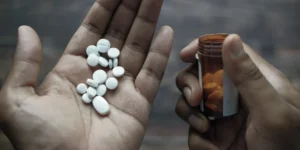Healing Begins When Understanding Addiction Becomes The Focus
How does Addiction Medicine integrate various treatment methods to effectively support individuals struggling with alcoholism and drug addiction? Our counsellors are here to help you today.
FREE ASSESSMENT082 747 3422Addiction Medicine is the speciality of treating people suffering with the disease of alcoholism, drug addiction and related illnesses. It includes the evaluation, diagnosis and treatment of addicted people and is a part of addictionology. A doctor specialising in addiction medicine will usually form part of a multidisciplinary addictions team that combine their skills to more effectively and comprehensive address addicted people’s needs.
Addiction medicine is a branch of medicine specifically focused on the treatment and management of addiction. Addiction medicine plays a important role in rehab centers and addiction treatment programs, as it combines medical knowledge with expertise in addiction to provide comprehensive care. Medical professionals who specialise in addiction medicine are trained to address both the physical and psychological aspects of addiction, tailoring treatment plans to meet individual needs.
Interestingly, addiction medicine has a rich history, dating back several decades. In the early 19th century, the first treatment centers for alcoholism emerged in the United States. Over time, the field has evolved considerably, incorporating advancements in medical research and the development of evidence-based practices.
In the addiction recovery community, you may come across several terminologies associated with addiction medicine. One common term is “”detoxification”” or simply “”detox,”” which refers to the process of removing toxic substances from the body. Medical professionals closely monitor this phase to ensure safety and provide necessary support throughout withdrawal.
Another term you may encounter is “”medication-assisted treatment”” (MAT). This approach combines the use of medications, such as methadone or buprenorphine with counselling and behavioural therapies to treat opioid addiction. MAT has proven effective in reducing withdrawal symptoms and cravings, allowing individuals to focus on their recovery.
Addiction medicine also accentuates the importance of addressing co-occurring mental health conditions, known as “”dual diagnosis”” or “”comorbidity.”” Many individuals struggling with addiction also present mental health disorders, such as depression or anxiety. Proper diagnosis and integrated treatment for these conditions are vital for successful recovery.
It is worth noting that addiction medicine recognises addiction as a chronic disease, similar to other medical conditions like diabetes or hypertension. This perspective helps remove the stigma associated with addiction, promoting empathy and understanding in society.
Addiction medicine has gained recognition as a specialised field of medicine with several certifications and training programs available for healthcare professionals interested in this area. As a result, more professionals are equipped to provide effective and evidence-based care to those struggling with addiction.

Crack cocaine is the purified rock form of cocaine that is smoked rather than inhaled.…

The Painkiller Nobody Talks About Until It Wrecks Someone Demerol has a strange place in…

Titration in the context of addiction treatment and rehab refers to the careful adjustment of…
How does experiencing alcoholism in our social circles shape our understanding of its impact on personal relationships and society as a whole?
What are some common misconceptions about addiction recovery that hinder individuals from recognizing the positive changes it can bring to their lives?
Inpatient Rehab
Rehab care is a good option if you are at risk of experiencing strong withdrawal symptoms when you try stop a substance. This option would also be recommended if you have experienced recurrent relapses or if you have tried a less-intensive treatment without success.
Outpatient
If you're committed to your sobriety but cannot take a break from your daily duties for an inpatient program. Outpatient rehab treatment might suit you well if you are looking for a less restricted format for addiction treatment or simply need help with mental health.
Therapy
Therapy can be good step towards healing and self-discovery. If you need support without disrupting your routine, therapy offers a flexible solution for anyone wishing to enhance their mental well-being or work through personal issues in a supportive, confidential environment.
Mental Health
Are you having persistent feelings of being swamped, sad or have sudden surges of anger or intense emotional outbursts? These are warning signs of unresolved trauma mental health. A simple assesment by a mental health expert could provide valuable insights into your recovery.
Is My Loved One Addicted?
Your responses are private and not stored.
It’s Professional.
Clinically grounded
Clear, practical guides on addiction and recovery, based on recognised treatment principles and South African experience.
Therapy for addictionIt’s Affordable.
Straight talk on costs
We unpack typical fees, medical-aid issues, and funding options so you can compare treatment choices without sales pressure.
Paying for treatmentIt’s Convenient.
On your terms
Short explainers, checklists, and FAQs you can read, save, and share in your own time, from any device.
What to expect in rehabIt’s Effective.
Better decisions
We focus on evidence-based guidance and honest discussion of risks, relapse, and family impact to support long-term recovery.
Evidence-based
















